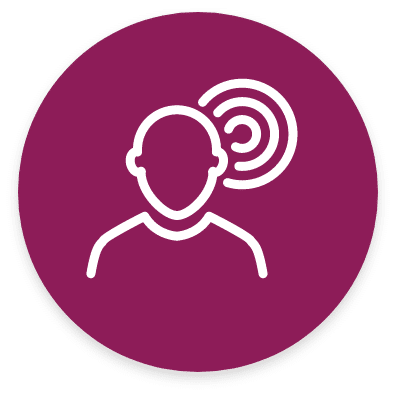WHAT IS TINNITUS?
Tinnitus is a hearing condition where people hear noises, such as hisses, hums, buzzes, whooshing, or cicadas.
The sounds have no external source (that is, no one else can hear them) and it’s often called ‘ringing in the ears’.
People experience tinnitus in many different ways. It can be constant or occasional, loud or soft, mild or severe.
Tinnitus can be heard in one or both ears or “in the head”. People may develop tinnitus because there is damage in their hearing system.
Tinnitus may start because of damage to the inner ear, but it is actually generated by the brain.
Tinnitus is not a condition itself, but a symptom of something else. It is usually caused by a change in your hearing system. This may be as simple as a blocked ear due to a cold or flu, or even wax build up in your ears. Tinnitus may also be due to the effect of certain medications, neck or jaw issues, or exposure to loud noise. Usually, the first step is to get in touch with an audiologist who can check your hearing, help you understand your tinnitus and discuss a management plan.
Tinnitus can also change over time in response to many factors, including our physical and mental health. You may work with an audiologist to understand the things that make your tinnitus better, or worse, as you work towards management. The more we understand our tinnitus, the more we can regain control and actively work towards reducing its impact on our life.
There are many ways we can mange tinnitus.
HOW CAN I GET HELP?
If you are experiencing tinnitus for the first time, it may be helpful to know that you are not alone. Some people fear that their tinnitus will get worse forever, but that isn’t true.
There are many different healthcare professionals who can help to manage your tinnitus, depending on its cause. You may see an audiologist if you have hearing loss, a physiotherapist if you have jaw or neck issues, or a psychologist if tinnitus is causing anxiety or stress.

There are many different treatment options for the management of tinnitus.
The purpose of tinnitus management is to help you to “habituate” to the sound. Sometimes our brains decide that the tinnitus sound is a threat, or something important that it must pay attention to. Our brains go into high alert and trigger our “fight or flight” response, meaning that we pay even more attention to the tinnitus.
Management involves training the brain that tinnitus is not an important sound, and it is not something that needs our attention. There are a variety of management techniques that can assist you to habituate.

HOW MANY PEOPLE HAVE TINNITUS?
Estimates of prevalence vary greatly around the world, but the Australian government accept that about one in three people in Australia have experienced tinnitus at some point in their life and about one in six struggles everyday with constant tinnitus.
Between 70 and 85 per cent of people with hearing loss suffer from tinnitus, and it is not only older people who are affected.
A study by Hearing Australia, a federal government agency, showed that up to 70% of people aged 18 to 35 years have experienced tinnitus and 16% experience it more than once a week.
33% MAJOR DEPRESSION
Studies have established links between depression and anxiety for people with tinnitus to the extent that 45 per cent of tinnitus sufferers experience anxiety and 33 per report major depression.
2% VERY DISTRESSING
We believe, after careful review of available studies, that tinnitus is present in more than 90% of the population, that around 30% of people become aware of their tinnitus, between 15% and 20% of people report constant tinnitus and about 2% of people in Australia, or about 500,000 people find their tinnitus very distressing.
TINNITUS
ONLINE RESOURCES
TAKE ON
TINNITUS
The British Tinnitus Association sponsors a great introduction to tinnitus causes and remedies through their Take on Tinnitus modules. Although some of the references are UK specific, the core information is applicable to anyone with tinnitus. Tinnitus Australia will be working to develop a similar resource for Australia, but in the meantime we encourage you to take a look.
TINNIBOT & T-MINUS
MOBILE APPS
There are a number of apps and treatment databases available to support people with tinnitus, but not all resources are equal! These resources take different approaches to managing tinnitus and are supported by quality research.
CBT online
self help
iCBT is a comprehensive online self-help CBT program for Tinnitus, the result of collaborative work between UK audiologists, hearing scientists and clinical psychologists based on clinical practice and research.

OPEN
Monday to Friday
9am to 5pm
Subscribe
Sign up to receive updates from Tinnitus Australia.



